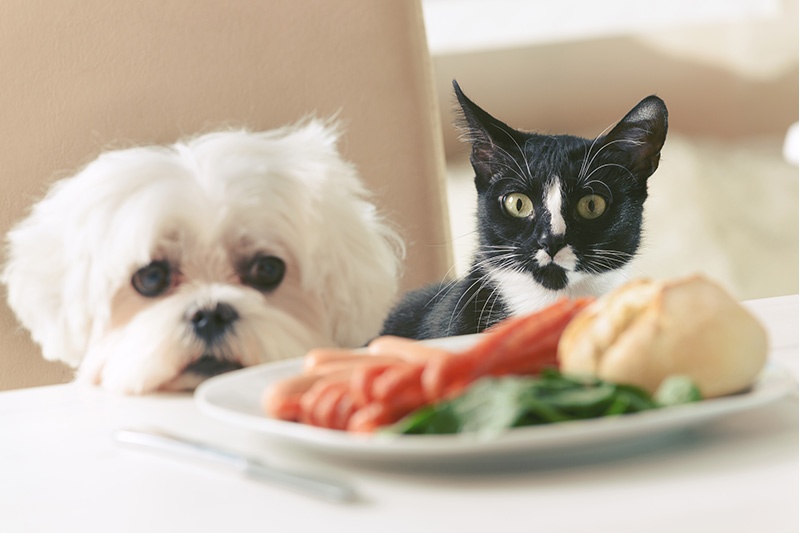
Sharing feasts with loved ones is a common way to celebrate many of the holidays that come up this time of year, but there are some foods you should never ever share with your dogs and cats, regardless of how festive the occasion!
While I am all about going the extra mile to celebrate your furry friends and show them your gratitude with a special meal, that doesn’t mean I encourage you to go hog wild feeding them from your own holiday dinner plate. There are lots of foods that tickle your human taste buds that can be downright dangerous if given to your beloved four-legged.
And I mean, really, who wants to be dealing with a sick pooch or kitty amid all the holiday hustle and bustle? It’s stressful for them (and you) to have an upset tummy or need a trip to the emergency vet, so it’s best to stick to high-quality, biologically appropriate meals and treats for your fur-babies.
Our local emergency veterinary clinic, MedVet, told me that they typically see a 25% increase in GI related cases during the holidays. That’s a lot, folks! So let’s help spread this knowledge and keep our marvelous four-legged friends happy and healthy this holiday season and all year long by avoiding these 6 types of food.
Cooked Bones
While it is safe to feed your furry friend raw bones from time to time (and with supervision), cooked bones are dangerous and should never be given to cats or dogs. All that succulent, roasted meat can be tempting to your 4-legged carnivores, but be careful! Where there’s meat, there are bones. Be sure to dispose of all the cooked chicken, turkey, beef or ham bones because they will be dehydrated and brittle from the heat and can cause anything from an upset tummy to constipation, to a perforated gut.
Excessive Animal Fat
Turkey or chicken skin, certain cuts of pork or beef, and gravy are all high in fat and difficult for your furry friends to digest. I know it’s tempting to share this fare with your drooling buddy, but the fact is these types of food can cause a very painful illness known as pancreatitis. This inflammation of the pancreas will most likely cause vomiting and diarrhea and may very well land you and your companion at the local veterinary emergency hospital.
Grapes, Raisins and Currants
Grapes, raisins and currents are delicious to humans and can be found in many common finger foods and in dressing. However, they can cause sudden kidney failure in dogs and cats. Although the actual toxin remains unidentified, it’s clear that raisins contain a more concentrated amount and ingesting just a small amount has been fatal for both cats and dogs. Vomiting and hyperactive behavior are the initial signs of poisoning. The more severe signs are not seen for 24-48 hours after ingestion – often after acute kidney failure has already begun.
Chocolate
Chocolate contains theobromine and caffeine, both of which are toxic to cats and dogs. Different forms of chocolate contain more or less of these substances, with baking chocolate having the most and white chocolate having the least. Dogs are notorious for detecting that one present under the Christmas tree that contains the finest, hand painted chocolates, so stow your holiday treats out of reach. Signs of chocolate toxicity include vomiting, diarrhea and hyperactivity, and they can occur within 12 hours.
Onions, Garlic, Chives & Leeks
Your holiday fare such as stuffing, gravy, green bean casserole, or even meat marinades and rubs contain a lot of onions and garlic, which are a strict no-no for your furry friends. Onions, garlic, chives and leeks contain a toxic principle known as N-propyl disulfide. This compound causes a breakdown of red blood cells leading to anemia in dogs and cats. While vomiting and diarrhea may occur within one day, it may take several days to a week after your pet eats garlic or onion for symptoms of anemia to appear.
Nuts
Some nuts are downright toxic to dogs and cats (I’m lookin’ at you macadamia nuts), but even nuts that aren’t considered toxic are still difficult for your furry friend to digest. Because they are high in fat, nuts can cause GI upset, especially if your furry friend has a sensitive tummy or is predisposed to pancreatitis. Even the almonds, walnuts, or pecans found in cranberry sauce or desserts such as pecan pies are large enough to cause an intestinal obstruction for smaller animals.
